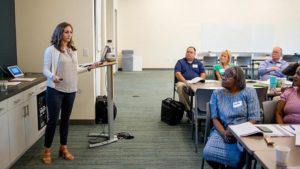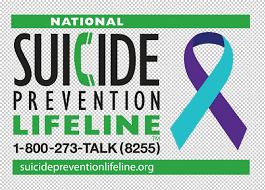TRANSPARENCIES
A monthly newsletter from Integral Care.
A monthly newsletter from Integral Care.

A Message From Our CEO
The recent deaths of Anthony Bourdain and Kate Spade brought suicide into the national conversation. The media’s approach to covering death by suicide of a public figure or influencer can have a positive or negative impact on suicide rates. Studies have shown that media coverage surrounding a suicide is linked to an increase in suicide rates, especially for young people. Alternatively, thoughtful media reporting can inspire people to get the help and support they need when focused on prevention.
Suicide is preventable, yet it is one of the leading causes of death in our state. It affects all of us – regardless of race, ethnicity, age or gender. September is National Suicide Prevention Awareness Month, an opportunity to promote awareness and share resources to help save lives.
This month is also back to school for our children and youth – a good time to draw attention to the importance of having mental health and suicide prevention services on school grounds. For young Texans ages 15-34, suicide is the second leading cause of death. Integral Care believes that early intervention is key to improving the overall health of our young people. On-campus mental health services help prevent suicides by providing counseling, suicide risk assessment, education to improve communication skills between parents and children, psychiatric care and connection to other local resources.
Teachers and parents can play a key role in early detection of warning signs and behaviors indicating that a child may be considering suicide. Trouble focusing, increased withdrawal from family, friends and school, a lack of interest in favorite activities and risk-taking behaviors are a few signs that indicate suicide risk. Considering students spend a significant portion of their day in school, suicide prevention awareness and on-campus mental health services can create an opportunity to proactively identify and engage youth in critical, supportive services.
Integral Care’s on-campus mental health services in four Travis County school districts are at the heart of our suicide prevention efforts for children and youth. Thanks to funding awarded by a behavioral health grant through House Bill 13 (HB13), we are adding more psychiatric services and therapists in Manor, Del Valle and Pflugerville Independent School Districts (ISDs), and a triage therapist in Manor and Del Valle. Triage therapists provide crisis prevention and intervention as well as mental health training for school staff. HB13 is also helping Integral Care provide ongoing mental health services in 16 Austin ISD schools. For academic year 2016-2017, 2,595 AISD youth received behavioral health services, including suicide screenings. 684 of those students received comprehensive assessment and psychotherapy services. For those children and youth, myriad barriers to mental health care were reduced.
At the state level, our Legislators are making mental health a priority. Last month, the Senate Select Committee on Violence in Schools and School Security released a report recommending the expansion of Mental Health First Aid (MHFA) training for school staff. Integral Care offers MHFA training, providing school staff the basic tools to help someone showing signs of a mental health challenge or experiencing a mental health crisis. Over the summer, we’ve seen an increase in educators and administrators taking MHFA, showing our community schools are committed to the mental health of our youth.
Integral Care is also pleased to announce a collaboration with Crisis Text Line, a national organization that provides free, 24/7 crisis support via text. Crisis Text Line will increase access to crisis care for people who prefer texting to talking, expanding 24/7 crisis support in our community. To connect to Crisis Text Line, text TX to 741741. Integral Care continues to provide immediate crisis support over the phone 24 hours a day, 7 days a week through our 24/7 Crisis Helpline at 512-472-HELP (4357).
This month, I encourage you to familiarize yourself with all community resources – mental health centers, school programs and other prevention resources. Help is available. Together, we can positively impact the mental health of our community and save lives.

David Evans
Chief Executive Officer
Suicide Prevention Services
Integral Care provides an array of community-wide suicide prevention trainings and services. Our mental health crisis services and education efforts include the 24/7 Crisis Helpline, Mobile Crisis Outreach Teams and Mental Health First Aid (MHFA) training. So far this year, 1,585 members of our community, 17% of whom are educators, have taken MHFA through Integral Care.
 We provide trainings to clinical professionals and organizations throughout the community – such as 211, YWCA, El Buen Samaritano, Capitol staffers and private therapists. Trainings teach specific evidence-based tools such as the Columbia-Suicide Severity Rating Scale and a strategy called Safety Planning Intervention. We recently delivered a successful training for all Austin-Travis County EMS 911 dispatchers entitled “Holding Space with Callers,” which included customized sessions designed around the special challenges of a dispatcher handling a mental health crisis.
We provide trainings to clinical professionals and organizations throughout the community – such as 211, YWCA, El Buen Samaritano, Capitol staffers and private therapists. Trainings teach specific evidence-based tools such as the Columbia-Suicide Severity Rating Scale and a strategy called Safety Planning Intervention. We recently delivered a successful training for all Austin-Travis County EMS 911 dispatchers entitled “Holding Space with Callers,” which included customized sessions designed around the special challenges of a dispatcher handling a mental health crisis.
We work closely with schools through our campus-based mental health services. In the event of a suicide, we respond with immediate postvention strategies, providing on-campus support to facilitate healing for students, family and school staff.
We also lead the Austin-Central Texas Suicide Prevention Coalition, with co-chair Seton Ascension. The coalition strives to reduce suicides through advocacy efforts, implementation of evidence-based strategies, support for people impacted by suicide and trainings for the community. Suicide prevention resources for professionals and the community are available on the Austin-Central Texas Suicide Prevention Coalition webpage.
National Suicide Prevention Lifeline
The National Suicide Prevention Lifeline (NSPL) is a free, confidential hotline that provides 24/7 emotional support to anyone in distress or a mental health crisis, anywhere in the United States. The Lifeline collaborates with a network of over 150 crisis centers across the U.S., to connect callers to local care and resources that follow best practices in suicide prevention. Integral Care has been a part of the NSPL network since 2012. All calls to their hotline coming from a 512 or 737 area code are routed to our 24/7 Crisis Helpline.
 The widely advertised NSPL number has a far reach so it’s important that our Helpline answers local calls to NSPL because we can connect callers to local resources. (The number is even the title of rapper Logic’s well-known song “1-800-273-8255”.) Integral Care can dispatch our Mobile Crisis Outreach Team, navigate the caller to Psychiatric Emergency Services, or arrange an intake appointment at one of our clinics. According to Laura Gold, Integral Care’s Prevention Services Program Manager, “Callers feel that there’s support around them, within their community. That’s vital when someone is feeling like ending their life.”
The widely advertised NSPL number has a far reach so it’s important that our Helpline answers local calls to NSPL because we can connect callers to local resources. (The number is even the title of rapper Logic’s well-known song “1-800-273-8255”.) Integral Care can dispatch our Mobile Crisis Outreach Team, navigate the caller to Psychiatric Emergency Services, or arrange an intake appointment at one of our clinics. According to Laura Gold, Integral Care’s Prevention Services Program Manager, “Callers feel that there’s support around them, within their community. That’s vital when someone is feeling like ending their life.”
The Lifeline is also more than a hotline. They have a variety of initiatives to improve crisis services and suicide prevention, including their #BeThe1To toolkit and You Matter, a safe space for youth to talk about mental health. A rotating council of individuals ages 13-24 writes the blog.
September: Anyone Can Save a Life
August: A Milestone Moment
July: Equity in Mental Health Care for All
June: Expanding Services for Veterans
May: Your Mental Health Toolkit
April: Time of Terror Calls for Increased Emotional Support
March: Stopping the cycle of incarceration for individuals with mental illness
February : Equity in mental healthcare for everyone
January : Improving Mental Health Through Partnership & Collaboration
December : Strength Through Community
November : Healthy Lifestyles Improve Well-Being
October : National Child Health Day
September : Strengthening Families and Communities